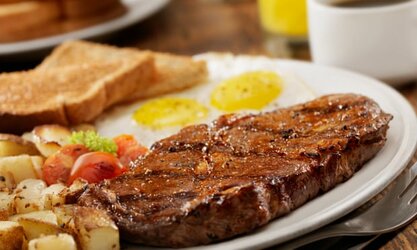
Men’s meaty diets are responsible for 40% more climate-heating emissions than those of women, according to a UK study.
The research also found a quarter of diet-related emissions were from “optional” food and drink, such as coffee, alcohol, cakes and sweets. The scientists said policies to encourage sustainable diets should focus on plant-based foods but switching drinks and cutting down on sweet snacks presented further opportunities.
A second study found in western countries, vegan and vegetarian diets were about a third cheaper to buy than regular diets, which the researchers said contrasted with the perception that they were the “preserve of a privileged middle class”.
https://www.theguardian.com/food/20...-seaweed-in-my-week-eating-a-climatarian-diet
Food production causes 30% of greenhouse gas emissions, and previous studies have shown that meat-eating in rich countries must be sharply reduced in order to tackle the climate crisis, largely caused by the methane and deforestation associated with cattle. But these studies have looked at the average emissions of broad food categories.
The new study, published in the journal Plos One, analysed the emissions linked to more than 3,200 specific food items and examined the diets of 212 British people, who recorded their food and drink intake over three 24-hour periods. It found animal products were responsible for almost half of the average diet’s greenhouse gas emissions: 31% from meat and 14% from dairy. Drink caused 15% of emissions and 8% came from cakes, biscuits and confectionery.
The research also showed that non-vegetarian diets created 59% more emissions than vegetarian diets. Men’s diets had 41% more emissions, largely due to eating more meat but also due to more drinks.
“We all want to do our bit to help save the planet,” said the scientists, led by Holly Rippin, at the University of Leeds. “Working out how to modify our diets is one way we can do that. There are broad-brush concepts like reducing our meat intake, particularly red meat, but our work also shows that big gains can be made from small changes, like cutting out sweets.”
Rippin said the research did not assess why men ate more meat. “But we can speculate that it could be because men generally eat more food than women,” she said. “We could also speculate that men may eat more traditional meat-based diets.”
Another recent study found that men’s spending on goods caused 16% more emissions than women’s, despite the sum of money being very similar, mostly due to higher spending on petrol and diesel for cars.
The scientists’ database also includes 40,000 branded food items, and they said that future research could allow people to cut their food emissions by swapping brands.
The study analysing the costs of different diets was published in the journal The Lancet Planetary Health. It compared seven sustainable diets to the current typical diet in 150 countries using food prices from the World Bank.
It found that in high-income countries, vegan diets were the most affordable, reducing food costs by 21-34% compared to average diets, depending on specific food choices. Vegetarian diets were a close second, with 27-31% reduction in cost.
https://www.theguardian.com/lifeand...ream-how-millions-got-a-taste-for-going-vegan
A flexitarian diet, with low amounts of meat and dairy, reduced costs by 14%, but fish-based pescatarian diets actually increased costs by 2%. The study focused on whole foods and did not include highly processed meat replacements or eating at restaurants or takeaways.
“We think the fact that vegan, vegetarian and flexitarian diets can save you a lot of money is going to surprise people,” said Marco Springmann, at the University of Oxford, who led the second study. “When scientists like me advocate for healthy and environmentally-friendly eating it’s often said that we’re sitting in our ivory towers promoting something that is financially out of reach for most people. This study shows that it’s quite the opposite. These diets could be better for your bank balance as well as your health and the health of the planet.”
A recent survey for WWF found that more than 70% of Britons believed people should eat food that was better for the environment, but 65% said sustainable options were too expensive.
Current average diets in rich nations do not align with nutritional guidelines, with meat-eating higher than recommended levels. Both the new studies confirm previous work that healthy diets are also lower-emission diets.

Men’s meat-heavy diets cause 40% more climate emissions than women’s, study finds
Research also shows 25% of diet-related emissions are from ‘optional’ food and drinks, such as coffee, alcohol and cake







